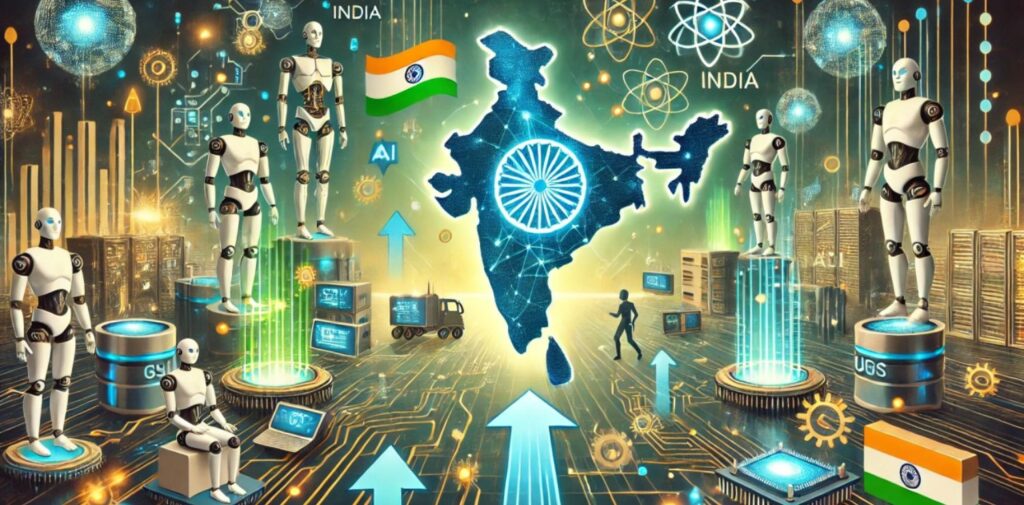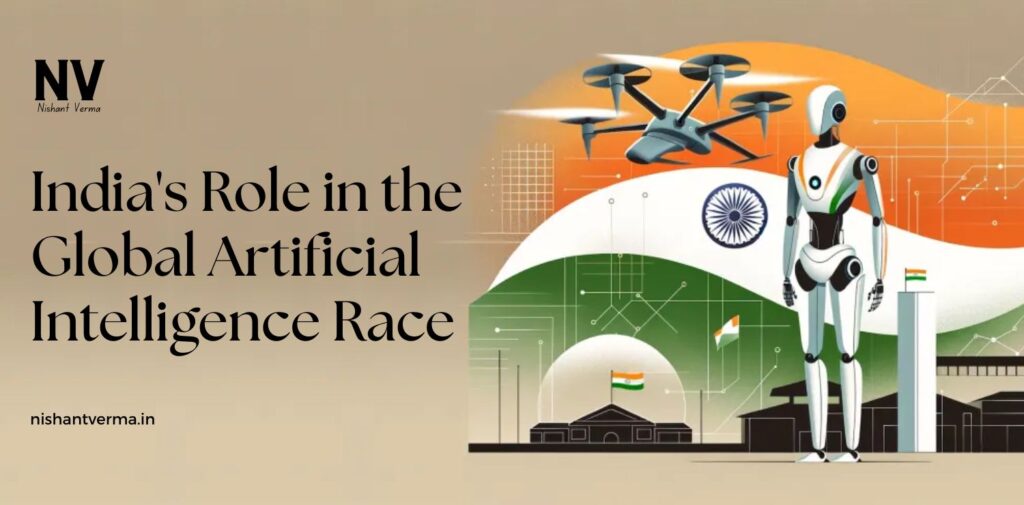Artificial Intelligence (AI) has emerged as one of the most transformative technologies of the 21st century. From self-driving cars to virtual assistants, AI is reshaping industries and societies worldwide. As countries around the globe race to lead in AI development, India has established itself as an emerging player in this field. With a rich pool of talent, a growing technology sector, and an expanding digital ecosystem, India is well-positioned to take advantage of AI’s potential. This article explores India’s role in the global Artificial Intelligence race and how the country is contributing to the development and adoption of this cutting-edge technology.
India’s Growing AI Ecosystem
India’s journey into the world of AI is gaining momentum. The country boasts a robust technology ecosystem, with several tech hubs, including Bengaluru, Hyderabad, and Pune, where AI research and development are taking place at a rapid pace. India is home to some of the world’s leading tech companies, startups, and research institutions that are heavily invested in AI.
The Indian government has recognized the importance of AI and has laid the foundation for its growth through initiatives like the National Strategy for Artificial Intelligence (AI for All). This strategy, announced in 2018 by NITI Aayog, aims to position India as a global leader in AI by leveraging its strengths in data, technology, and human resources. It focuses on key sectors like healthcare, agriculture, education, and smart cities, where AI has the potential to bring about significant improvements.
AI startups in India are also on the rise, with entrepreneurs leveraging machine learning, data analytics, and automation to solve local and global challenges. India’s AI market is expected to grow exponentially in the coming years, with startups playing a key role in its growth by developing AI-driven solutions that can transform industries and improve lives.

AI in Indian Industries
AI’s impact on various industries in India is already evident. The technology is being widely adopted across sectors such as healthcare, education, agriculture, finance, and retail. In the healthcare sector, AI is being used to diagnose diseases, predict patient outcomes, and assist in personalized treatments. Indian startups like Niramai and SigTuple are using AI to detect conditions like cancer and diabetes early, with the potential to save millions of lives.
In agriculture, AI is helping farmers increase productivity by offering solutions for precision farming. AI-powered tools help in predicting weather patterns, optimizing irrigation, and identifying pests and diseases. This not only improves crop yield but also reduces costs and minimizes the environmental impact of farming. Companies like AgNext are working to bring AI innovations to India’s agriculture sector, which is crucial to the livelihoods of millions of people.
In education, AI is transforming the way students learn and teachers teach. AI-enabled platforms are offering personalized learning experiences by analyzing individual student’s learning patterns and adapting lessons to their needs. Edtech companies like Byju’s and Vedantu are incorporating AI to make education more accessible and efficient, especially in a country like India, where the education system is often burdened by a shortage of resources.
In the financial sector, AI is being used to enhance fraud detection, improve customer service, and automate processes. AI-driven chatbots, for example, are streamlining customer service in Indian banks, making it easier for users to resolve queries and carry out transactions. Companies like Razorpay and ZestMoney are leveraging AI to revolutionize digital payments and lending in India.
India’s AI Talent Pool
One of India’s greatest assets in the AI race is its vast and highly skilled talent pool. The country produces a large number of engineers and data scientists each year, making it a hub for AI research and development. Indian universities and institutions like the Indian Institutes of Technology (IITs) and Indian Institute of Science (IISc) are conducting cutting-edge research in AI, and many Indian professionals are making significant contributions to global AI advancements.
Moreover, India’s talent pool is supported by a growing number of AI-focused training programs, boot camps, and online courses. Many young professionals are actively upskilling themselves in areas like machine learning, natural language processing, and deep learning, which are central to AI development. The demand for AI talent is rising rapidly, and India is well-placed to provide the skilled workforce needed to meet this demand.
Furthermore, India is home to several multinational tech companies, such as Google, Microsoft, IBM, and Amazon, that have established research and development centers in the country. These companies are not only investing in AI research but also working with Indian talent to develop AI solutions that can address both local and global challenges.

AI and Government Initiatives
The Indian government is playing a pivotal role in driving AI adoption across the country. Recognizing the potential of AI to boost economic growth and improve public services, the government has launched several initiatives aimed at promoting AI development. The AI for All strategy outlined by NITI Aayog emphasizes the need for a coordinated approach to AI, with a focus on both the private and public sectors.
One of the key pillars of this strategy is the establishment of AI research centers, which will focus on developing solutions tailored to India’s unique challenges. The government has also set up the Artificial Intelligence Research Centre of Excellence (AIREX), which aims to promote AI research and development in areas like healthcare, agriculture, and governance.
Additionally, the Indian government is exploring the use of AI in public services, such as law enforcement and governance. AI is being used to enhance surveillance, predict crimes, and improve the efficiency of administrative processes. By leveraging AI, the government hopes to provide better services to citizens and improve the overall quality of life.
India’s Global AI Partnerships
India’s role in the global AI race is not just limited to domestic development; the country is also actively engaging with international partners to advance AI research. India has formed collaborations with countries like the United States, Japan, and Israel to exchange knowledge, resources, and expertise in the field of AI.
India is also a key player in global AI governance discussions. The country has actively participated in forums and summits, such as the G20 AI Principles and OECD AI Policy Observatory, where global leaders discuss the ethical, regulatory, and social implications of AI. India’s perspective on AI is shaped by its focus on inclusive growth and its commitment to ensuring that AI benefits all sections of society, including marginalized communities.
Moreover, India is an active participant in global AI standards-setting bodies and initiatives, where the country’s views on data privacy, AI ethics, and regulation are helping shape the future of AI at the global level. These partnerships not only help India gain access to the latest AI advancements but also ensure that the country’s AI policies are in line with global trends and practices.

Challenges and Opportunities for India in the AI Race
While India is making significant strides in the AI race, there are several challenges it must overcome to fully realize the potential of this technology. One of the biggest challenges is the digital divide. Despite India’s growing digital infrastructure, there are still vast rural areas with limited access to the internet, making it difficult for many people to benefit from AI-driven solutions. Bridging this gap and ensuring that AI reaches every corner of the country will be crucial for India’s long-term success in AI.
Another challenge is the need for a strong AI regulatory framework. As AI technologies advance, ethical concerns regarding data privacy, bias, and accountability are becoming more prominent. India will need to develop robust policies and regulations to ensure that AI is used responsibly and ethically while fostering innovation.
However, these challenges also present significant opportunities. By addressing the digital divide and ensuring equitable access to AI technologies, India can ensure that the benefits of AI are shared by all its citizens. Additionally, India’s focus on ethical AI development, with an emphasis on inclusivity and social impact, can help set a global example for responsible AI use.
Conclusion: Global Artificial Intelligence
India’s role in the global AI race is rapidly growing, with the country making significant progress in AI research, industry adoption, and international collaborations. The combination of a skilled talent pool, strong government initiatives, and a thriving tech ecosystem positions India as a key player in shaping the future of AI. While challenges such as the digital divide and regulatory frameworks remain, India’s focus on inclusive growth and ethical AI development provides a strong foundation for the country to become a global leader in AI innovation. As AI continues to evolve, India’s contributions to this field will have a profound impact on both the domestic and global stage.




